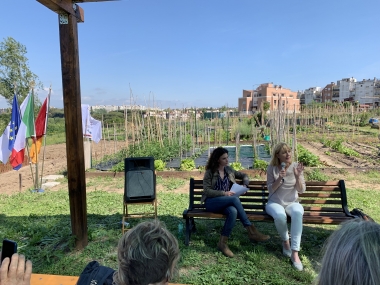Bilateral meeting Rome – Vilnius
Edited on
07 June 2019The first RU:RBAN Bilateral meeting between the cities of Rome and Vilnius took place in Rome on 24th May 2019. Key stakeholders and ULG members of both cities met at the Parco Ort9-Sergio Albani urban garden, in the southern area of Rome

The meeting was, in fact, the response to the request raised by the stakeholders of Vilnius to go into more detail on how to transfer to Vilnius the model of Rome’s Regulation of Urban gardens.
The Regulation, which had been shown and explained during Rome’s Transnational meeting last February, has already been translated into Lithuanian and discussed during the last Vilnius ULG meeting with the city’s key stakeholders. The focus for Vilnius now is how to adapt Rome’s Regulation to the Lithuanian laws on land management.
Experts and gardening enthusiasts met to discuss the social and economic benefits of urban gardens as people gave personal testimonies on how urban gardening has positively influenced their social life and health . The meeting was attended by representatives of the municipal institutions of the City of Vilnius and the City of Rome, gardeners, scholars, students from the University of Arkansas in Rome, experts in common goods as well as representatives of the “Vivere In…” Association and of the Neisos start-up, which manages the CART D`ORT R&D project focusing on mapping urban garden experiences in Rome and fostering the awareness of common goods.
When interviewed by the journalist of the Italian national newspaper la Repubblica who participated in the event, the President of the “Vivere in…” Association, Mr Filippo Cioffi, reiterated “the importance of creating a strong and healthy community to ensure that the way urban gardens are managed is as horizontal as possible, the garden is a tool to reach the real goal of sharing a common good”.
Key points & Lessons learned
The representatives of Vilnius have understood that a clear set of rules for the management of urban gardens is of the utmost importance. A crucial role in the management of the urban gardens is to be played by the President of the citizens’ association managing the area granted by the City Administration. The Association will also have to set up its own Management Committee to share all management activities with the President. Another interesting aspect learned by the Vilnius representatives is the potential increase of awareness in the urban agriculture experience brought in by the involvement of as many sectors of the community as possible: schools can involve their students in educational activities related to agriculture, the medical community can inform citizens of the therapeutic benefits of gardening, sociologists can analyze the impact of agricultural activities on community growth.
All participants agreed upon the fact that an urban garden is not the goal, but only the tool for communities to work and enjoy activities together.
 Submitted by Patricia Hernandez on
Submitted by Patricia Hernandez on
